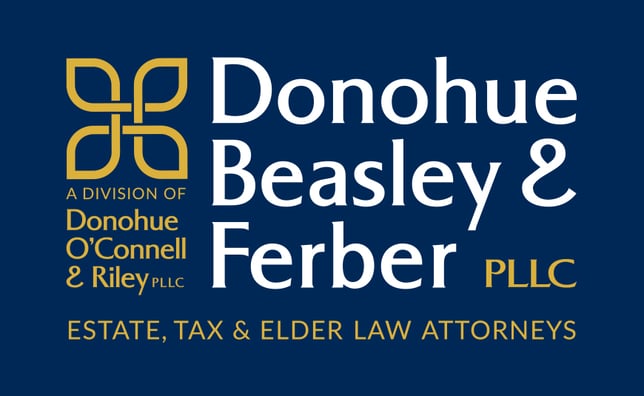BEASLEY & FERBER, P.A. AND THE NEW HAMPSHIRE OFFICE OF DONOHUE, O’CONNELL & RILEY PLLC COMBINE TO FORM DONOHUE, BEASLEY & FERBER PLLC

The combination will give Beasley & Ferber clients the opportunity to benefit from the firm’s local Seacoast presence and regional scope for sophisticated estate, tax and elder law planning.
Beasley & Ferber P.A. has been in existence for over 30 years and is looking forward to the next chapter in the firm’s long history. Attorney Edward “Ted” Beasley met Attorney Joseph M. Donohue through mutual business colleagues in Exeter and they found common ground in their deep commitment to helping families in the community in the areas of estate, tax and elder law. The combined firm, Donohue, Beasley & Ferber, PLLC will continue to operate at 55 Hall Street in Concord, 18 Hampton Road in Exeter and offices in Bedford, Nashua and North Andover, MA.
Ted, David, Ted’s nephew, Timothy O’Brien, along with their staff will be working closely with Joe and his team to ensure a smooth transition of relationships and files. Clients will be in good hands, as all three attorneys will continue in an active roles with the new firm.
Donohue, Beasley & Ferber, PLLC, will operate as the New Hampshire division of Donohue, O’Connell & Riley PLLC, a Northeast firm with has attorneys admitted in New York, New Jersey, Connecticut, Massachusetts, New Hampshire and Maine. The firm also has co-counsel relationships across the country and the world, to help with planning that can cross state lines and international boundaries. The firm has advised over 20,000 clients on how to structure their affairs and businesses in order to minimize taxes and assure the smooth transfer of wealth between generations.
We want to thank you for the privilege of helping you with your legal needs and look forward to serving you and your family in the future.
January 3, 2024
Sophisticated Planning
After working in the New York and Paris offices of a large international firm, attorney Joseph Donohue opened his own firm in 2007. In 2010, he acquired his first practice from a retiring solo practitioner, doubling the firm’s revenue. In 2017, he acquired the office of O’Connell & Riley with his business partner, Kristin A. Canty.
In the decade since, ten more practices have joined his fleet, expanding the firm from a single town in the Hudson Valley to seven offices across five states in the Northeast — with no signs of slowing down.
Today, Donohue, O’Connell & Riley, PLLC boasts experienced attorneys dedicated to providing a high level of legal services for the most complex estate and tax planning issues involving assets around the globe. Whether establishing a domestic trust to avoid taxes on a villa in Europe or executing an estate plan to conserve 500 acres of land to be used as a nature preserve in Nova Scotia, the firm employs creativity and know-how to help clients reach their goals.
“Clients have different objectives depending on their assets and where they are in life,” says Donohue. “It is fulfilling to find ways to accomplish their estate planning goals in an intelligent and tax-efficient fashion.”
Closer to home, the firm advises clients on how to take advantage of trust laws and low taxes in New Hampshire when they reside in highly taxed states. “We set up trusts in New Hampshire, a state that has no state income or estate taxes,” explains Donohue. “Once assets are placed in trust, they grow free of federal and state estate taxes without requiring clients to live in New Hampshire — it can be a win-win.”
TRUSTED ADVISORS
Establishing long-term, trusting relationships with clients is key to Donohue, O’Connell & Riley’s success. Clients need to feel comfortable in confiding sensitive financial information as well as private family dynamics to their lawyers to create a smooth and amicable transition of assets to beneficiaries during the administration of a trust or estate.
“We certainly navigate the financial piece to create value, but 80% of the job is understanding the emotional issues that are involved when assets pass from one generation to the next,” says Donohue. Having prepared over 10,000 estate plans, the firm’s attorneys have developed a sixth sense for how to navigate delicate family and business dynamics to avoid conflicts and eliminate unanticipated surprises.
That commitment to client service continues when it comes to legal fees. All estate plans are prepared on a flat fee basis, with clients advised of the tax savings attributable to the firm’s legal services. “We provide clients with the return on their investment up front,” says Donohue. “When planning for the future of your family, we believe fees should never get between a client and their lawyer. We want clients to be able to pick up the phone and call without feeling they will get another bill in the mail.”
Donohue, O’Connell & Riley strives to always have its clients’ best interests in mind and values being a part of their lives. “My relationships with my clients are very important to me,” says Donohue. “It is an honor to set up an estate plan for a client, giving them peace of mind that they have made a positive impact on future generations.”
June 20, 2023
Investing in our Warwick Office

After over 165 years, the firm’s Warwick office has recently undergone a major renovation. 11 Oakland Avenue was originally owned by the first mayor of the village of Warwick, William Ogden, and the last major update was in 1895. The current facelift includes an installation of a new roof, insulation and siding.
Our investment underscores our commitment to the firm’s first location and our hopes that it will continue to serve the community well into its third century as a fixture on Oakland Avenue.
February 9, 2023
Michael Jackson’s Estate and the IRS in Tax Court: A game of ‘Beat It’

Michael Jackson, often referred to as “the King of Pop”, left us in June 2009. As expected, the Executors of his Estate filed an estate tax return reporting the value of various assets. The IRS audited the Estate’s return, and later issued a notice of deficiency that adjusted the reported values in May of 2013. Although the Estate and the IRS settled most of the valuation disputes, there was a disagreement as to the value of three assets: (1) Jackson’s right to publicity (“Image and Likeness”); (2) The New Horizon Trust II, which held his 50% ownership interest in Sony/ATV (which owned a large catalog of copyrights, among which were some 175 songs by The Beatles); and, (3) the New Horizon Trust III, which held copyrights to compositions written or co-written by Michael Jackson, as well as other songwriters.
The Tax Court was then left with the task of determining the fair market value of these assets at Jackson’s date of death. The fair market value for estate tax purposes is defined as the price at which the property would exchange hands between a willing buyer and a willing seller. Given the unique nature of Jackson’s assets, however, the challenged assets lacked a readily ascertainable fair market value. Ultimately, the Court concluded that the value of these three assets totaled $111,467,473. This was a dramatic decrease from the $481,866,964 valuation of the IRS’s expert at trial.
As we can see from the outcome of this opinion, valuation of assets is key to estate tax planning. In some cases, it is best to gift high-growth, hard to value assets earlier, and let them grow outside of your estate, rather than holding onto them. This strategy may allow you to moonwalk past the tax headache and enjoy the benefits of today’s unprecedentedly high gift tax exemptions.
Carefully implemented, this gift tax strategy can allow you to benefit from the current gift tax exemption, without losing control of assets, and may allow you to reduce your estate tax burden significantly.
Contact us to see if this simple but effective strategy could be right for you.
Click here for the the in-depth source article.
June 9, 2021



